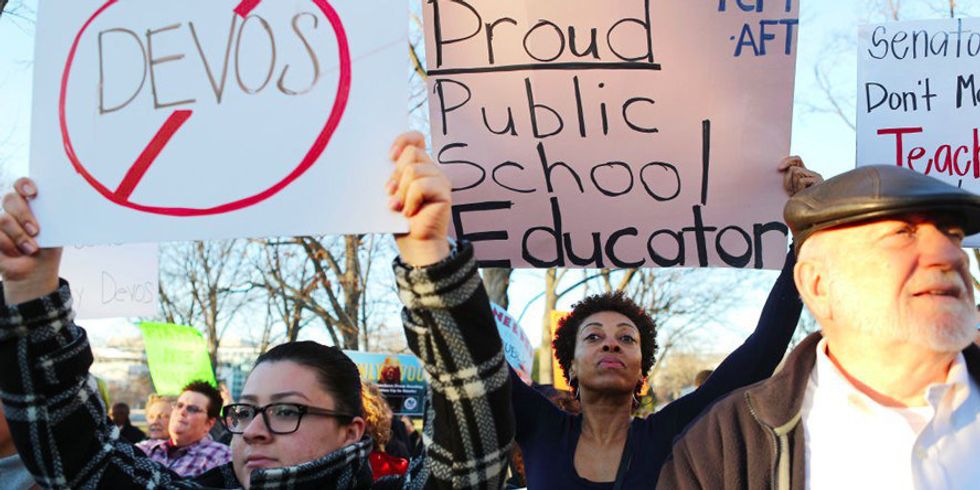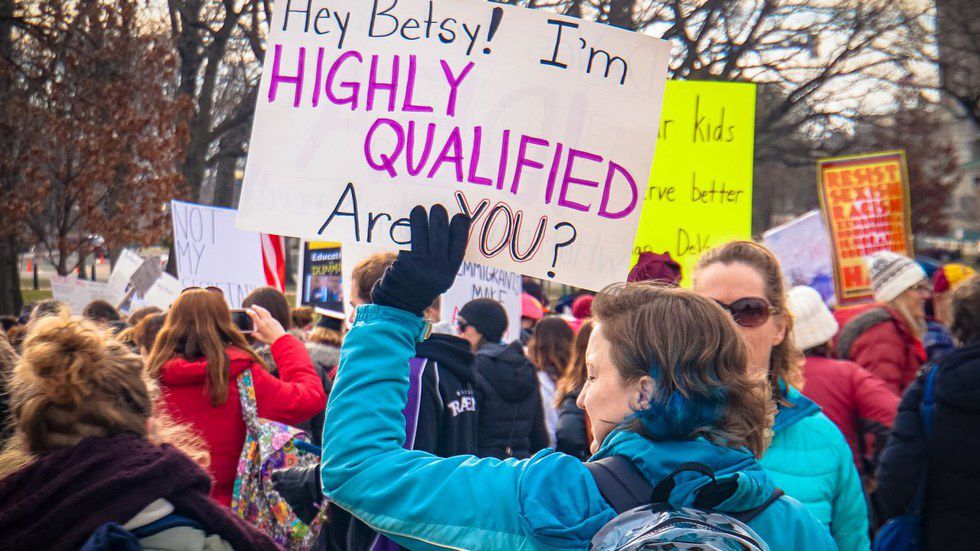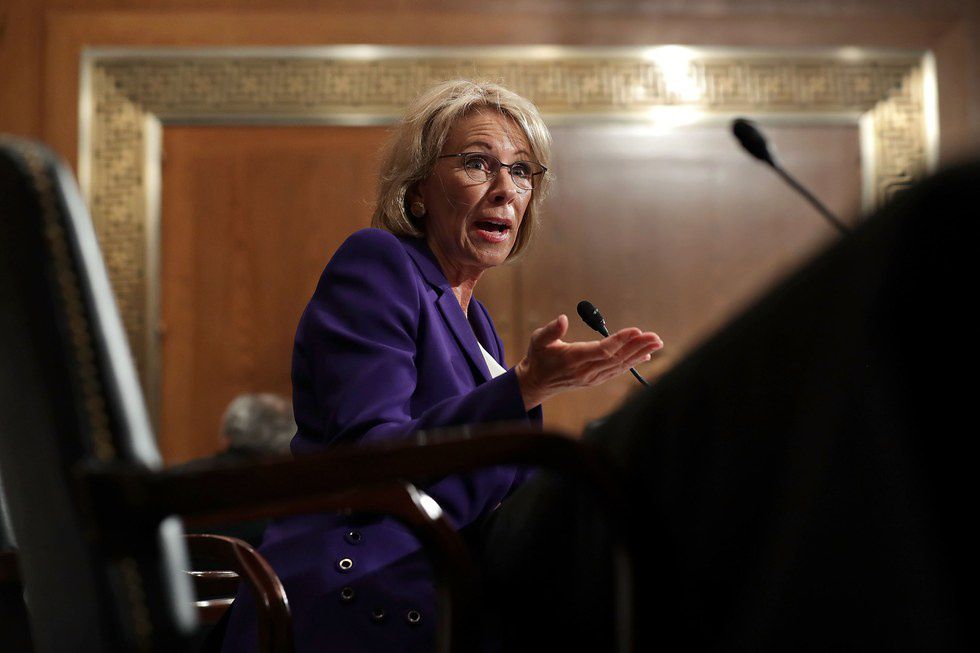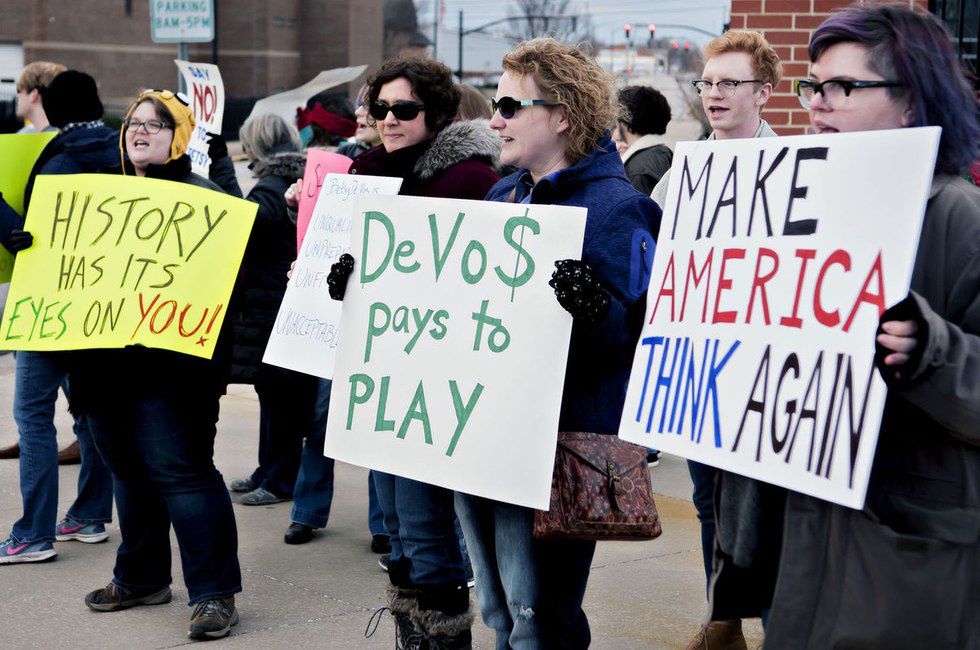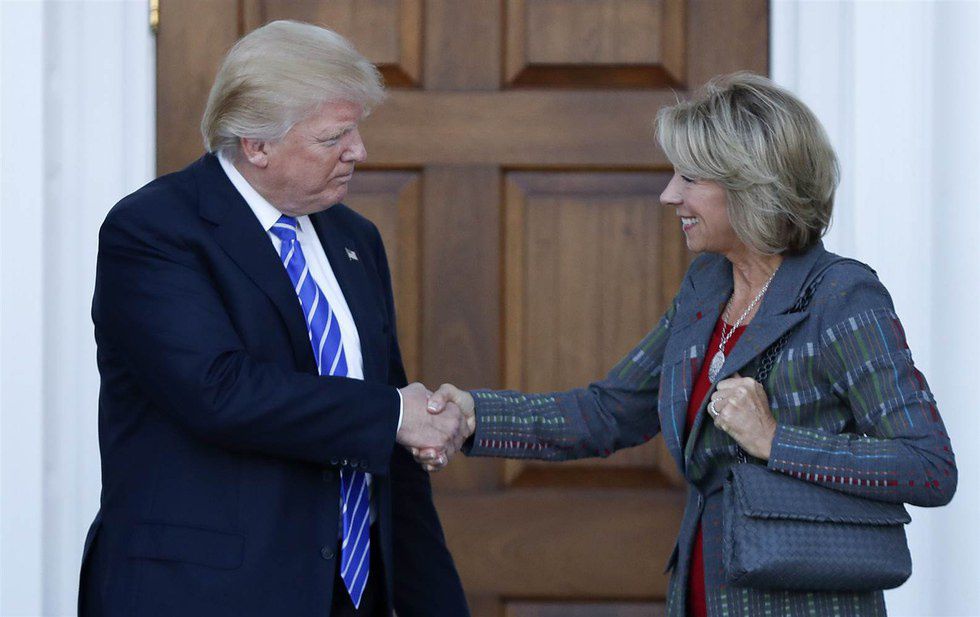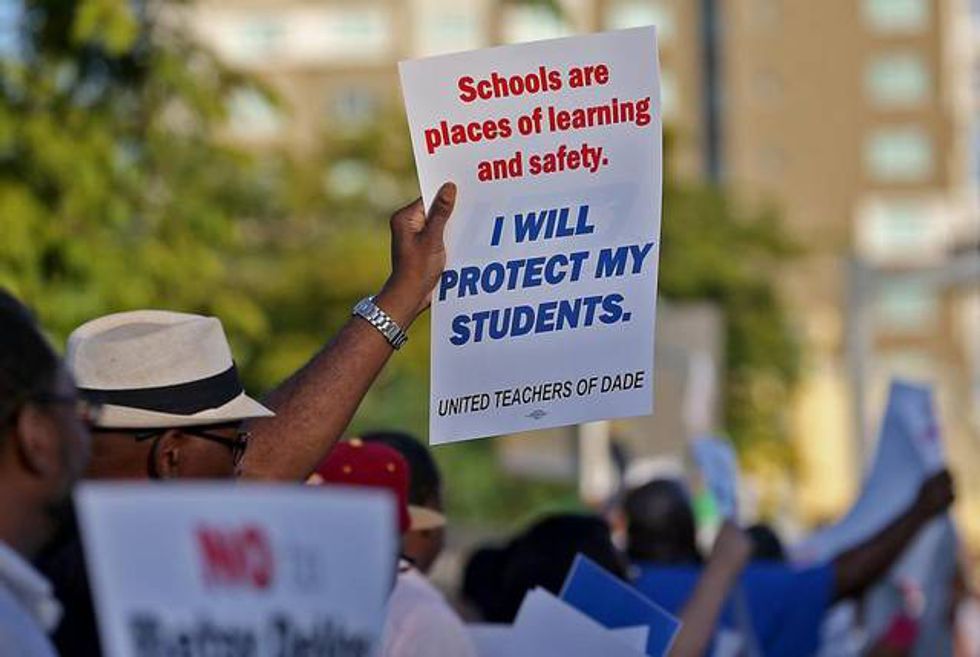On Tuesday, February 7, 2017 Betsy DeVos was confirmed as the next United States Secretary of Education.
As a billionaire donor with no previous experience in public education or any education degree, DeVos' nomination was embroiled in controversy from its inception. She fumbled through her Senate confirmation meeting and was subsequently met with a strong backlash from public school supporters and teachers unions. Senate Democrats debated long into the night and early Tuesday morning; the vote eventually came to a historic 50-50 split down party lines, apart from two Republican Senators who voted against DeVos, Lisa Murkowski of Alaska and Susan Collins of Maine. Vice President Mike Pence was called in to cast his vote and break the tie, making history as the first time that a vice president has been summoned to break a tie on a cabinet nomination.
Since then, educators around the country have voiced their outrage. In a press release, the president of the American Federation of Teachers, Randi Weingarten, said "DeVos shows an antipathy for public schools; a full-throttled embrace of private, for-profit alternatives; and a lack of basic understanding of what children need to succeed in school."
To get a better understanding of how those who worked in the education sector felt about the new Secretary of Education, I spoke to five local educators about their views on Betsy DeVos and the potential implications of her confirmation on the future of education in America.*
**Melissa is an administrator in upstate New York, with 20 years of experience in education. She has attended a public school, worked in a public school, and sent her children to public schools. She described the school she currently works for as having average needs.
Amanda is a 5th grade teacher at a charter school in upstate New York, with 5 years of education experience. She has attended a public school, and worked at a public school for 4 years. She described the school she currently works for as having low needs.
Pamela is a chemistry teacher at a public high school in upstate New York, with 18 years of experience in education. She has experience teaching in public schools, and she described the school she currently works for as having high needs.
Vicki is the Director of Curriculum at a private school for children with learning disabilities in New York City. She has 17 years of education experience, has attended a public high school, earned her undergraduate degree at a SUNY school, and earned her graduate degree at a CUNY school. She described the school she currently works for as having low needs.
Kristin is a teacher at a private Catholic school in upstate New York, with 20 years in if experience in education. She attended public school, and she described the school she currently works for as having high needs.
Compared to many other states, New York has high education standards for both educators and students. Betsy DeVos has proposed that we leave education "up to the states." As an educator in New York State, what are your thoughts on leaving these decisions to individual states?
Melissa: "I am supportive [of leaving education up to the states]. It allows for more localized control."
Amanda: "I think that for states that have high standards, it works. For states that don't, there is no accountability. Also, if a student moves [to a different] state, there will be no continuity of standards or curriculum."
Pamela: "New York has had standards and cumulative state assessments since before I started teaching. Massachusetts and California also had similar tests and standards. All three states also required a high level of proficiency and education of their teachers. Because of this, these three states have always had the best education systems in the country. If it was "left to the states," we would be okay. However, I am concerned about other states. With some sort of national standards and benchmarks, other states have been required to hit at least minimal standards for their students. I am afraid that these states will slide backwards without national guidance. I am particularly worried about science education in states that will allow religious groups influence what is taught in science classrooms."
Vicki: "I believe there is a minimal standard of quality we need to establish nationally and a minimum budget that needs to be established so that we do not have grossly underfunded schools in our country."
Kristin: "There needs to be cohesiveness among the states. Children don't generally stay in one area of the country. They need to be prepared to join the work force in any part of the country."
DeVos is a strong proponent of expanding charter schools, school choice, and for-profit education. What are your views on this?
Melissa: "I am strongly opposed. Charters and for-profit [schools] play by their own rules and use public funds to push their agendas. These schools can choose their students while siphoning funds from public schools."
Amanda: "I believe that every parent should have the right to send their child to the best school possible. I don't think that their ability to do so should be dependent on their socioeconomic status, their address, or intelligence. That being said, I don't believe for-profit education is the best way to achieve that."
Pamela: "I am against this. Charter schools, school choice, and for-profit education leach money from public schools, especially in areas that can ill-afford to lose funding. School choice/vouchers tend to benefit white, upper middle class children, and help to re-segregate schools. Moving towards charter schools, school choice, and for profit education will destroy the public education."
Vicki: "I believe those are increasingly important options for families, but [they are] a direct result of poor budgeting, mismanaged educational standards, and [there is] too broad of a focus on an inclusion model for special education, which I oppose."
Kristin: "I haven't listened too much because there was no mention of private or parochial schools."
In her Senate confirmation meeting, DeVos refused to agree with Senator Tim Kaine that all schools receiving federal funding (either public schools, public charter schools, or private schools receiving voucher money), should be held accountable to the same standards. What is your response to this?
Melissa: "They should absolutely be held to the same standards. If you want the funds, play by the rules."
Amanda: "If they are receiving federal funding, [all schools] should absolutely be accountable to the same standards. DeVos refusal to answer [Senator Kaine's question] makes me believe that she will arbitrarily impose these standards to make it difficult for some schools to continue to receive that aid."
Pamela: "I am angry. This is a means of gutting public education, because schools will be compared on different scales. The charter school advocates will then point to data that is not measured on the same scale [as public schools]."
Vicki: "I think we need accountability for all schools receiving public funds, but I am not convinced that the [current] "standards", if we are referring to the Common Core standards, are the correct metric."
Kristin: "Absolutely all schools should have the same accountability [standards], regardless of receiving funding get or not."
People have argued that Trump’s administration can’t cause significant damage if he is only in office for the next four years. What is your response to this?
Melissa: "I feel like things have already changed. I hope we continue to have an appropriate balance of power."
Amanda: "It only takes one bad piece of legislation, one year of minimal funding, or one year of chaos in schools to permanently affect a child's education and future."
Pamela: "Of course he can. Four years can dismantle the Department of Education, which will be impossible to reassemble afterwards. It can also gut federal funding for public schools, which will cause public schools to close."
Vicki: "When a child's quality of education is on the line (4 years is one third of their educational experience), it is a very long time for them."
Kristin: "Four years is one third of a child's education. There is never any time to waste!"
Finally, what would you say to those who are worried about or most affected by these proposed policy changes?
Melissa: "Poor students need a champion and so do public schools. I'm deeply disheartened."
Amanda: "Advocate, advocate, advocate. It is not simply enough to complain or share articles; we must make our voices heard. We have immense power if we use it correctly. With many officials up for reelection next year, it is imperative that we advocate for what is right."
Pamela: "I would say that teachers will fight anything that will impact our students in a negative way. We have been rolling with changes for years, and we have spoken up about the harm we have seen. We are not quiet, and we will not let our students suffer."
Vicki: "Get involved in your child's education. Pay attention at IEP meetings, get a second opinion, listen carefully to your child's teacher, and read to your child every night. Parents of special needs children, protect your child like a mama bear."
Kristin: Harass your representative to make sure your voice is heard.***
* Some answers have been edited or condensed for clarity
** For privacy purposes, some details regarding the names and workplaces of those who were interviewed have been changed or excluded.
*** To contact your local representative, call the U.S. Capitol Switchboard at 202-224-3121 and ask to be transferred.




